HI5015: Legal Aspects of International Trade and Enterprise Assignment
VerifiedAdded on 2023/01/20
|11
|2765
|41
Report
AI Summary
This report analyzes the legal aspects of international trade for Unilever, a multinational consumer goods company. It examines the legislative framework governing Unilever's operations in Australia, including the Food Act 2006, Food Regulations 2016, the Fair Work Act 2009, taxation laws, and the Competition and Consumer Act 2010. The report also explores the impact of treaties, conventions, and agreements on Unilever's products and services, such as the ASEAN-Australia-New Zealand Free Trade Agreement (AANZFTA), the Australia–United States Free Trade Agreement (AUSFTA), and the China-Australia Free Trade Agreement (ChAFTA). These agreements influence trade barriers, tariffs, and regulatory compliance, affecting Unilever's ability to operate and expand in markets like Australia, New Zealand, the United States, and China. The analysis highlights how these legal and international trade elements shape Unilever's business strategies and market access.
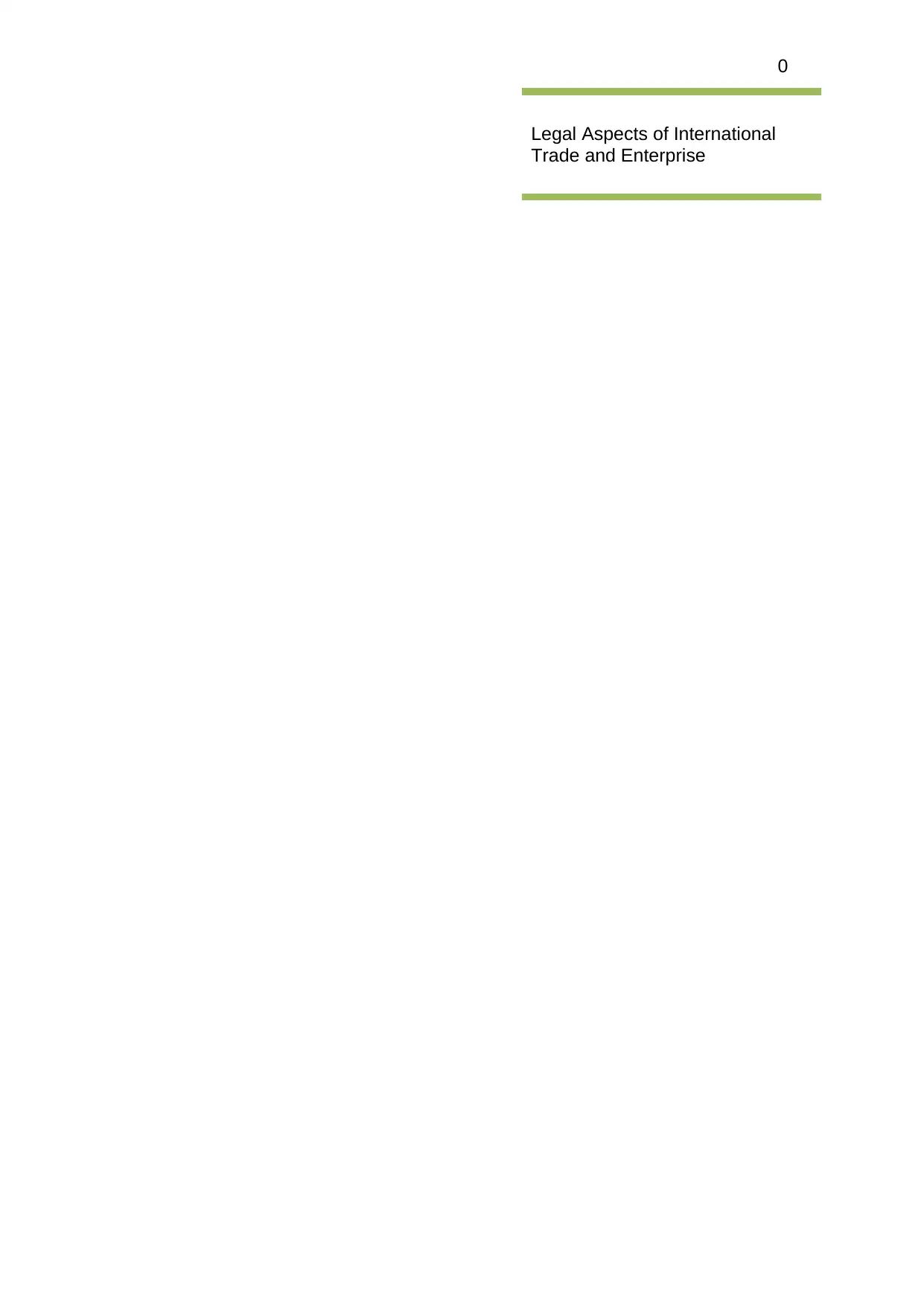
0
Legal Aspects of International
Trade and Enterprise
Legal Aspects of International
Trade and Enterprise
Paraphrase This Document
Need a fresh take? Get an instant paraphrase of this document with our AI Paraphraser
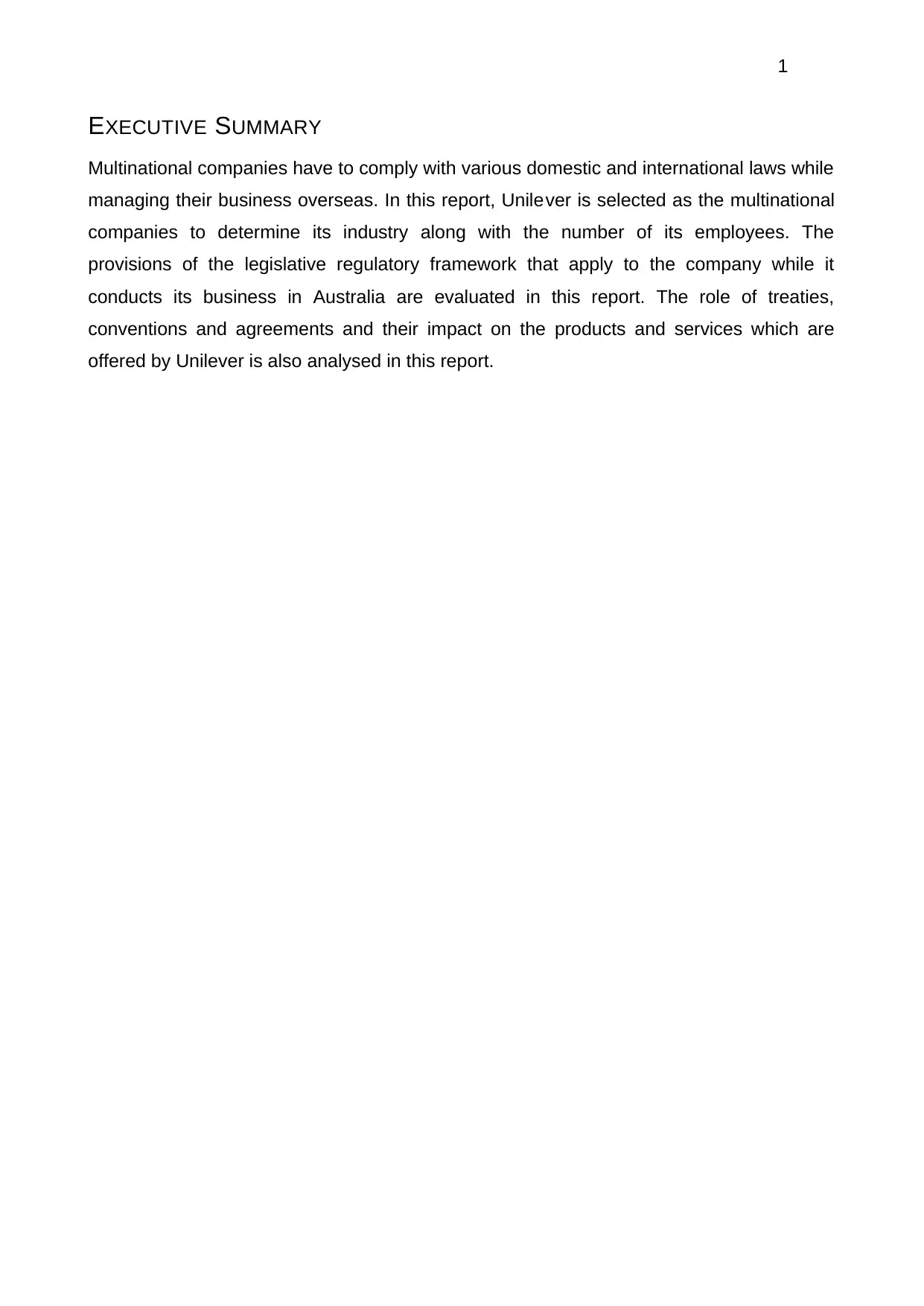
1
EXECUTIVE SUMMARY
Multinational companies have to comply with various domestic and international laws while
managing their business overseas. In this report, Unilever is selected as the multinational
companies to determine its industry along with the number of its employees. The
provisions of the legislative regulatory framework that apply to the company while it
conducts its business in Australia are evaluated in this report. The role of treaties,
conventions and agreements and their impact on the products and services which are
offered by Unilever is also analysed in this report.
EXECUTIVE SUMMARY
Multinational companies have to comply with various domestic and international laws while
managing their business overseas. In this report, Unilever is selected as the multinational
companies to determine its industry along with the number of its employees. The
provisions of the legislative regulatory framework that apply to the company while it
conducts its business in Australia are evaluated in this report. The role of treaties,
conventions and agreements and their impact on the products and services which are
offered by Unilever is also analysed in this report.
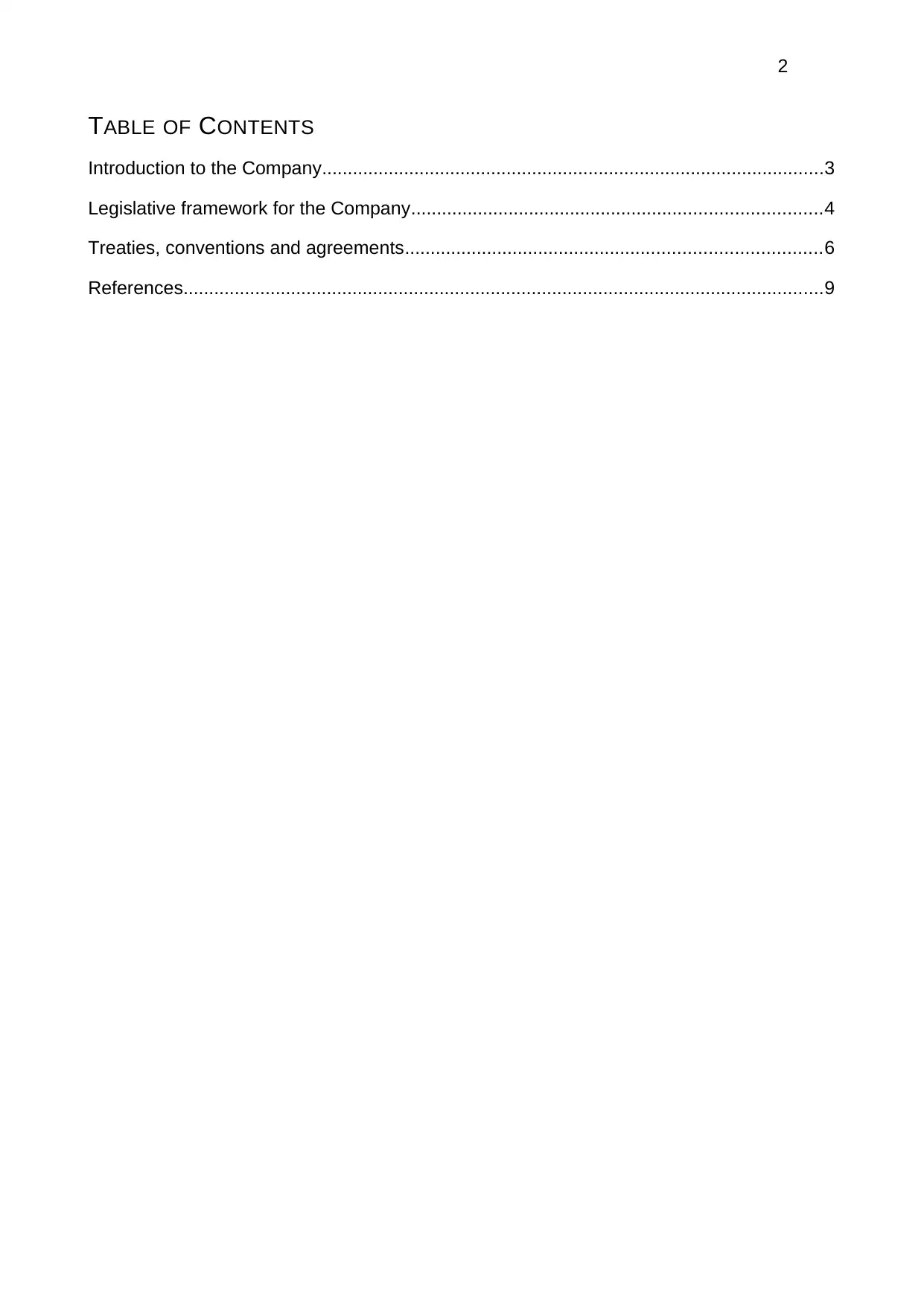
2
TABLE OF CONTENTS
Introduction to the Company..................................................................................................3
Legislative framework for the Company................................................................................4
Treaties, conventions and agreements.................................................................................6
References.............................................................................................................................9
TABLE OF CONTENTS
Introduction to the Company..................................................................................................3
Legislative framework for the Company................................................................................4
Treaties, conventions and agreements.................................................................................6
References.............................................................................................................................9
⊘ This is a preview!⊘
Do you want full access?
Subscribe today to unlock all pages.

Trusted by 1+ million students worldwide
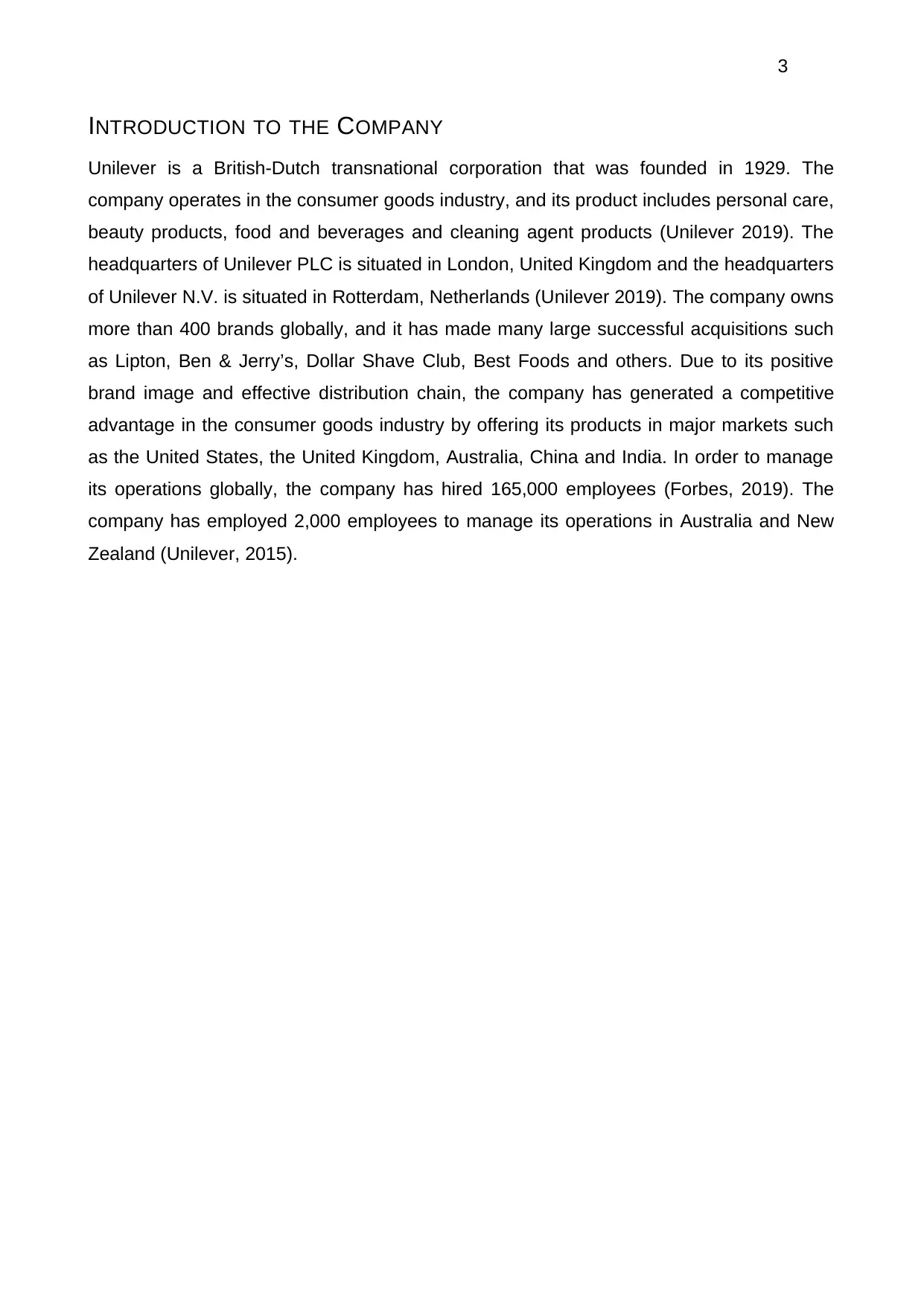
3
INTRODUCTION TO THE COMPANY
Unilever is a British-Dutch transnational corporation that was founded in 1929. The
company operates in the consumer goods industry, and its product includes personal care,
beauty products, food and beverages and cleaning agent products (Unilever 2019). The
headquarters of Unilever PLC is situated in London, United Kingdom and the headquarters
of Unilever N.V. is situated in Rotterdam, Netherlands (Unilever 2019). The company owns
more than 400 brands globally, and it has made many large successful acquisitions such
as Lipton, Ben & Jerry’s, Dollar Shave Club, Best Foods and others. Due to its positive
brand image and effective distribution chain, the company has generated a competitive
advantage in the consumer goods industry by offering its products in major markets such
as the United States, the United Kingdom, Australia, China and India. In order to manage
its operations globally, the company has hired 165,000 employees (Forbes, 2019). The
company has employed 2,000 employees to manage its operations in Australia and New
Zealand (Unilever, 2015).
INTRODUCTION TO THE COMPANY
Unilever is a British-Dutch transnational corporation that was founded in 1929. The
company operates in the consumer goods industry, and its product includes personal care,
beauty products, food and beverages and cleaning agent products (Unilever 2019). The
headquarters of Unilever PLC is situated in London, United Kingdom and the headquarters
of Unilever N.V. is situated in Rotterdam, Netherlands (Unilever 2019). The company owns
more than 400 brands globally, and it has made many large successful acquisitions such
as Lipton, Ben & Jerry’s, Dollar Shave Club, Best Foods and others. Due to its positive
brand image and effective distribution chain, the company has generated a competitive
advantage in the consumer goods industry by offering its products in major markets such
as the United States, the United Kingdom, Australia, China and India. In order to manage
its operations globally, the company has hired 165,000 employees (Forbes, 2019). The
company has employed 2,000 employees to manage its operations in Australia and New
Zealand (Unilever, 2015).
Paraphrase This Document
Need a fresh take? Get an instant paraphrase of this document with our AI Paraphraser
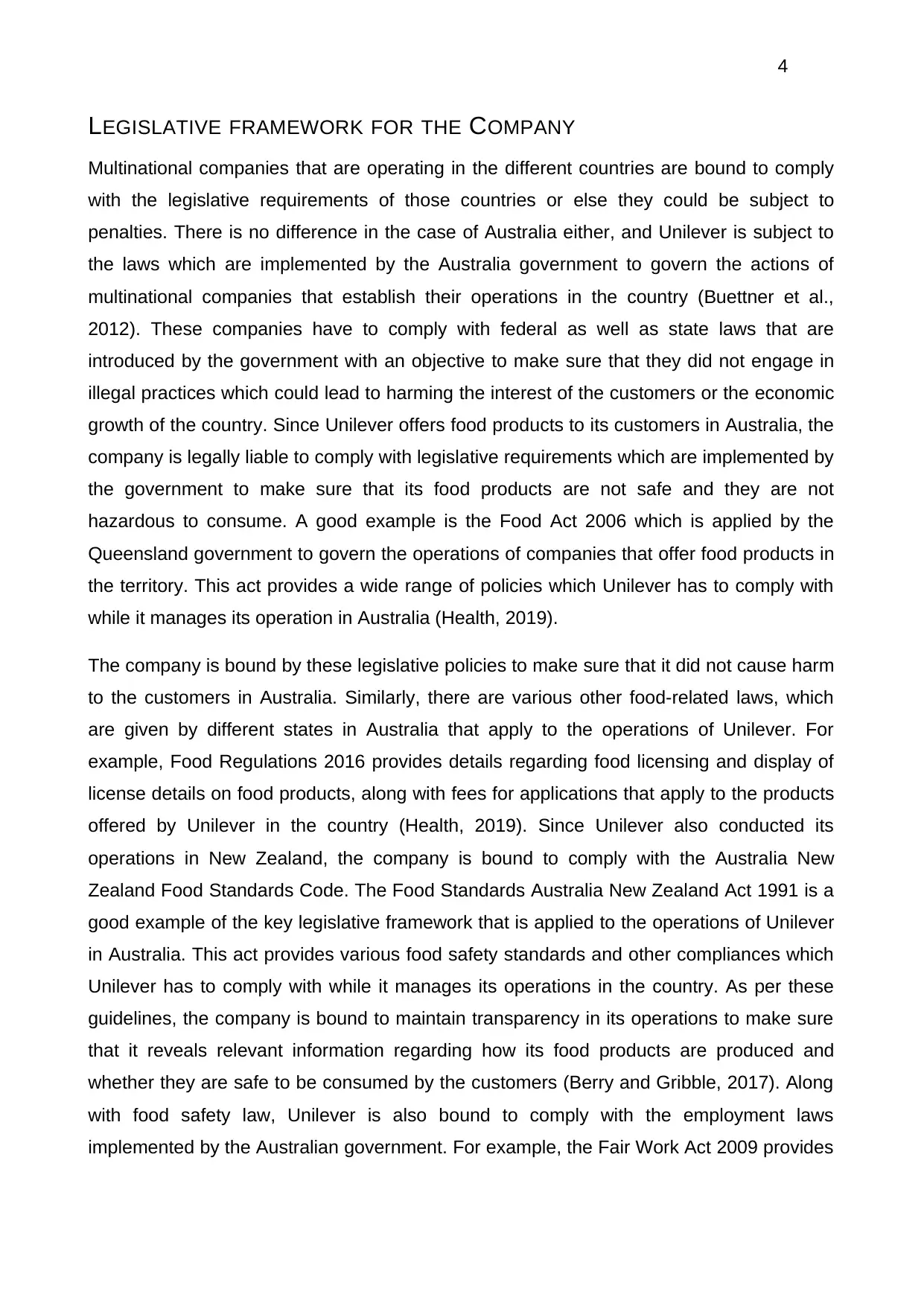
4
LEGISLATIVE FRAMEWORK FOR THE COMPANY
Multinational companies that are operating in the different countries are bound to comply
with the legislative requirements of those countries or else they could be subject to
penalties. There is no difference in the case of Australia either, and Unilever is subject to
the laws which are implemented by the Australia government to govern the actions of
multinational companies that establish their operations in the country (Buettner et al.,
2012). These companies have to comply with federal as well as state laws that are
introduced by the government with an objective to make sure that they did not engage in
illegal practices which could lead to harming the interest of the customers or the economic
growth of the country. Since Unilever offers food products to its customers in Australia, the
company is legally liable to comply with legislative requirements which are implemented by
the government to make sure that its food products are not safe and they are not
hazardous to consume. A good example is the Food Act 2006 which is applied by the
Queensland government to govern the operations of companies that offer food products in
the territory. This act provides a wide range of policies which Unilever has to comply with
while it manages its operation in Australia (Health, 2019).
The company is bound by these legislative policies to make sure that it did not cause harm
to the customers in Australia. Similarly, there are various other food-related laws, which
are given by different states in Australia that apply to the operations of Unilever. For
example, Food Regulations 2016 provides details regarding food licensing and display of
license details on food products, along with fees for applications that apply to the products
offered by Unilever in the country (Health, 2019). Since Unilever also conducted its
operations in New Zealand, the company is bound to comply with the Australia New
Zealand Food Standards Code. The Food Standards Australia New Zealand Act 1991 is a
good example of the key legislative framework that is applied to the operations of Unilever
in Australia. This act provides various food safety standards and other compliances which
Unilever has to comply with while it manages its operations in the country. As per these
guidelines, the company is bound to maintain transparency in its operations to make sure
that it reveals relevant information regarding how its food products are produced and
whether they are safe to be consumed by the customers (Berry and Gribble, 2017). Along
with food safety law, Unilever is also bound to comply with the employment laws
implemented by the Australian government. For example, the Fair Work Act 2009 provides
LEGISLATIVE FRAMEWORK FOR THE COMPANY
Multinational companies that are operating in the different countries are bound to comply
with the legislative requirements of those countries or else they could be subject to
penalties. There is no difference in the case of Australia either, and Unilever is subject to
the laws which are implemented by the Australia government to govern the actions of
multinational companies that establish their operations in the country (Buettner et al.,
2012). These companies have to comply with federal as well as state laws that are
introduced by the government with an objective to make sure that they did not engage in
illegal practices which could lead to harming the interest of the customers or the economic
growth of the country. Since Unilever offers food products to its customers in Australia, the
company is legally liable to comply with legislative requirements which are implemented by
the government to make sure that its food products are not safe and they are not
hazardous to consume. A good example is the Food Act 2006 which is applied by the
Queensland government to govern the operations of companies that offer food products in
the territory. This act provides a wide range of policies which Unilever has to comply with
while it manages its operation in Australia (Health, 2019).
The company is bound by these legislative policies to make sure that it did not cause harm
to the customers in Australia. Similarly, there are various other food-related laws, which
are given by different states in Australia that apply to the operations of Unilever. For
example, Food Regulations 2016 provides details regarding food licensing and display of
license details on food products, along with fees for applications that apply to the products
offered by Unilever in the country (Health, 2019). Since Unilever also conducted its
operations in New Zealand, the company is bound to comply with the Australia New
Zealand Food Standards Code. The Food Standards Australia New Zealand Act 1991 is a
good example of the key legislative framework that is applied to the operations of Unilever
in Australia. This act provides various food safety standards and other compliances which
Unilever has to comply with while it manages its operations in the country. As per these
guidelines, the company is bound to maintain transparency in its operations to make sure
that it reveals relevant information regarding how its food products are produced and
whether they are safe to be consumed by the customers (Berry and Gribble, 2017). Along
with food safety law, Unilever is also bound to comply with the employment laws
implemented by the Australian government. For example, the Fair Work Act 2009 provides
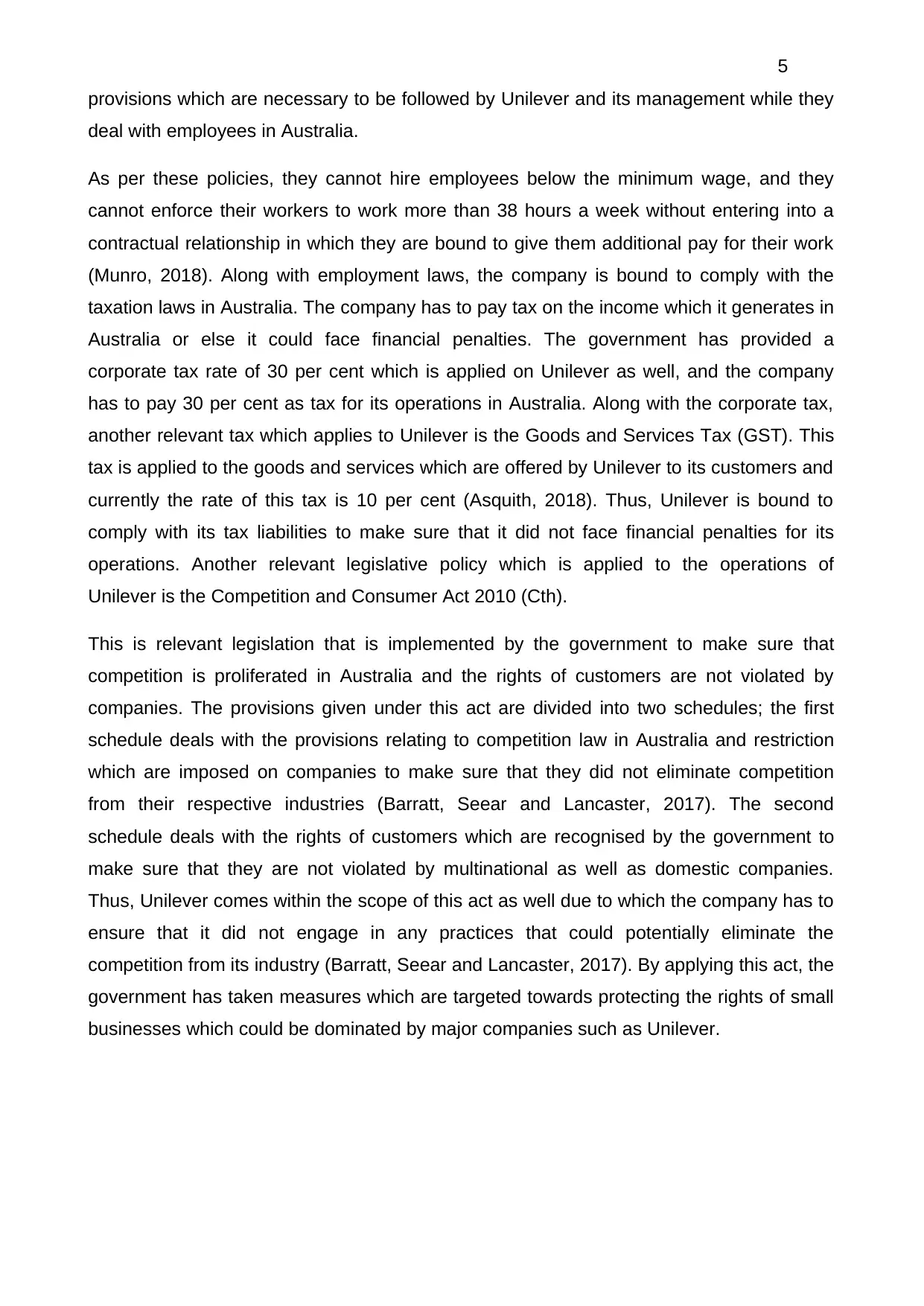
5
provisions which are necessary to be followed by Unilever and its management while they
deal with employees in Australia.
As per these policies, they cannot hire employees below the minimum wage, and they
cannot enforce their workers to work more than 38 hours a week without entering into a
contractual relationship in which they are bound to give them additional pay for their work
(Munro, 2018). Along with employment laws, the company is bound to comply with the
taxation laws in Australia. The company has to pay tax on the income which it generates in
Australia or else it could face financial penalties. The government has provided a
corporate tax rate of 30 per cent which is applied on Unilever as well, and the company
has to pay 30 per cent as tax for its operations in Australia. Along with the corporate tax,
another relevant tax which applies to Unilever is the Goods and Services Tax (GST). This
tax is applied to the goods and services which are offered by Unilever to its customers and
currently the rate of this tax is 10 per cent (Asquith, 2018). Thus, Unilever is bound to
comply with its tax liabilities to make sure that it did not face financial penalties for its
operations. Another relevant legislative policy which is applied to the operations of
Unilever is the Competition and Consumer Act 2010 (Cth).
This is relevant legislation that is implemented by the government to make sure that
competition is proliferated in Australia and the rights of customers are not violated by
companies. The provisions given under this act are divided into two schedules; the first
schedule deals with the provisions relating to competition law in Australia and restriction
which are imposed on companies to make sure that they did not eliminate competition
from their respective industries (Barratt, Seear and Lancaster, 2017). The second
schedule deals with the rights of customers which are recognised by the government to
make sure that they are not violated by multinational as well as domestic companies.
Thus, Unilever comes within the scope of this act as well due to which the company has to
ensure that it did not engage in any practices that could potentially eliminate the
competition from its industry (Barratt, Seear and Lancaster, 2017). By applying this act, the
government has taken measures which are targeted towards protecting the rights of small
businesses which could be dominated by major companies such as Unilever.
provisions which are necessary to be followed by Unilever and its management while they
deal with employees in Australia.
As per these policies, they cannot hire employees below the minimum wage, and they
cannot enforce their workers to work more than 38 hours a week without entering into a
contractual relationship in which they are bound to give them additional pay for their work
(Munro, 2018). Along with employment laws, the company is bound to comply with the
taxation laws in Australia. The company has to pay tax on the income which it generates in
Australia or else it could face financial penalties. The government has provided a
corporate tax rate of 30 per cent which is applied on Unilever as well, and the company
has to pay 30 per cent as tax for its operations in Australia. Along with the corporate tax,
another relevant tax which applies to Unilever is the Goods and Services Tax (GST). This
tax is applied to the goods and services which are offered by Unilever to its customers and
currently the rate of this tax is 10 per cent (Asquith, 2018). Thus, Unilever is bound to
comply with its tax liabilities to make sure that it did not face financial penalties for its
operations. Another relevant legislative policy which is applied to the operations of
Unilever is the Competition and Consumer Act 2010 (Cth).
This is relevant legislation that is implemented by the government to make sure that
competition is proliferated in Australia and the rights of customers are not violated by
companies. The provisions given under this act are divided into two schedules; the first
schedule deals with the provisions relating to competition law in Australia and restriction
which are imposed on companies to make sure that they did not eliminate competition
from their respective industries (Barratt, Seear and Lancaster, 2017). The second
schedule deals with the rights of customers which are recognised by the government to
make sure that they are not violated by multinational as well as domestic companies.
Thus, Unilever comes within the scope of this act as well due to which the company has to
ensure that it did not engage in any practices that could potentially eliminate the
competition from its industry (Barratt, Seear and Lancaster, 2017). By applying this act, the
government has taken measures which are targeted towards protecting the rights of small
businesses which could be dominated by major companies such as Unilever.
⊘ This is a preview!⊘
Do you want full access?
Subscribe today to unlock all pages.

Trusted by 1+ million students worldwide
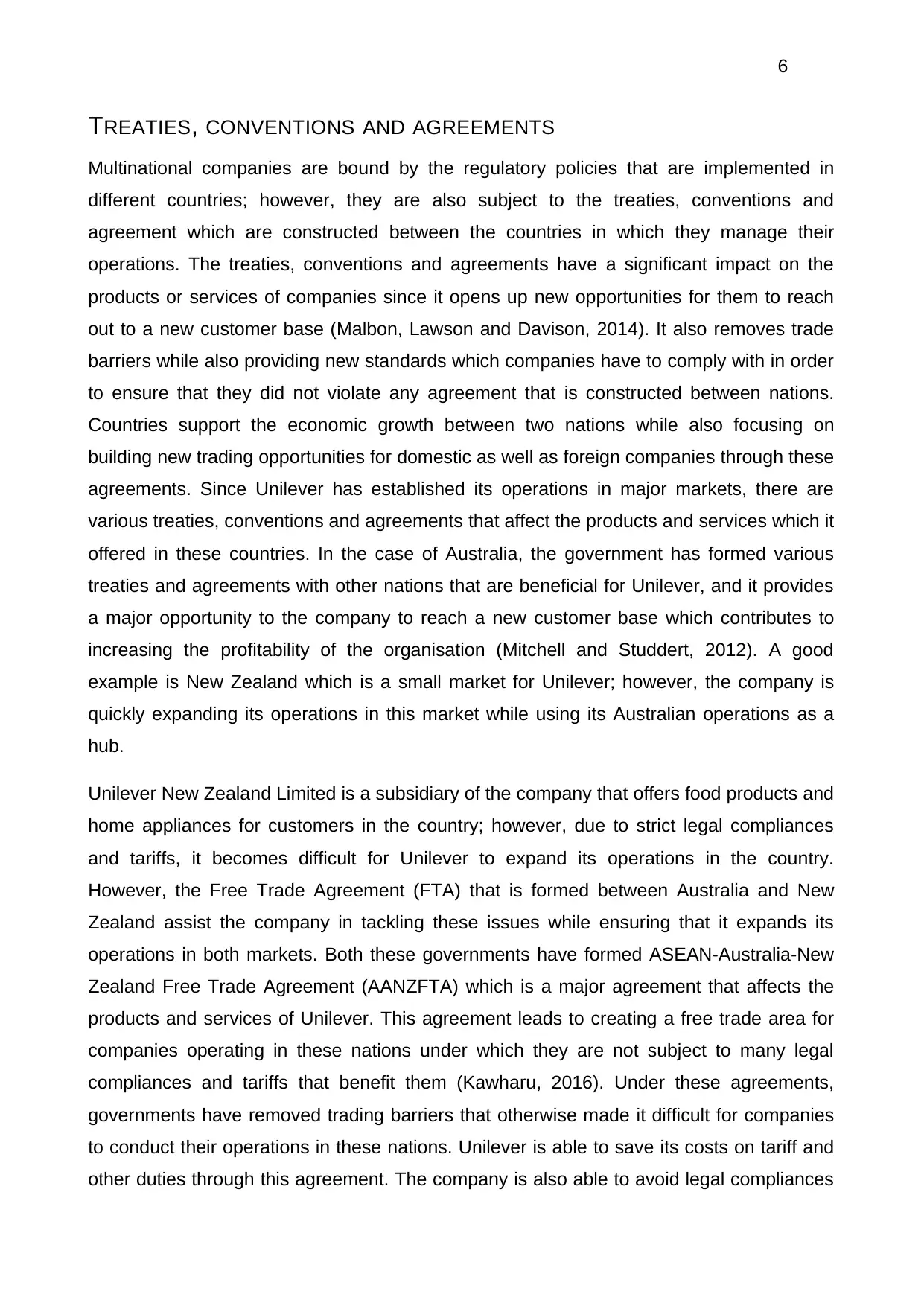
6
TREATIES, CONVENTIONS AND AGREEMENTS
Multinational companies are bound by the regulatory policies that are implemented in
different countries; however, they are also subject to the treaties, conventions and
agreement which are constructed between the countries in which they manage their
operations. The treaties, conventions and agreements have a significant impact on the
products or services of companies since it opens up new opportunities for them to reach
out to a new customer base (Malbon, Lawson and Davison, 2014). It also removes trade
barriers while also providing new standards which companies have to comply with in order
to ensure that they did not violate any agreement that is constructed between nations.
Countries support the economic growth between two nations while also focusing on
building new trading opportunities for domestic as well as foreign companies through these
agreements. Since Unilever has established its operations in major markets, there are
various treaties, conventions and agreements that affect the products and services which it
offered in these countries. In the case of Australia, the government has formed various
treaties and agreements with other nations that are beneficial for Unilever, and it provides
a major opportunity to the company to reach a new customer base which contributes to
increasing the profitability of the organisation (Mitchell and Studdert, 2012). A good
example is New Zealand which is a small market for Unilever; however, the company is
quickly expanding its operations in this market while using its Australian operations as a
hub.
Unilever New Zealand Limited is a subsidiary of the company that offers food products and
home appliances for customers in the country; however, due to strict legal compliances
and tariffs, it becomes difficult for Unilever to expand its operations in the country.
However, the Free Trade Agreement (FTA) that is formed between Australia and New
Zealand assist the company in tackling these issues while ensuring that it expands its
operations in both markets. Both these governments have formed ASEAN-Australia-New
Zealand Free Trade Agreement (AANZFTA) which is a major agreement that affects the
products and services of Unilever. This agreement leads to creating a free trade area for
companies operating in these nations under which they are not subject to many legal
compliances and tariffs that benefit them (Kawharu, 2016). Under these agreements,
governments have removed trading barriers that otherwise made it difficult for companies
to conduct their operations in these nations. Unilever is able to save its costs on tariff and
other duties through this agreement. The company is also able to avoid legal compliances
TREATIES, CONVENTIONS AND AGREEMENTS
Multinational companies are bound by the regulatory policies that are implemented in
different countries; however, they are also subject to the treaties, conventions and
agreement which are constructed between the countries in which they manage their
operations. The treaties, conventions and agreements have a significant impact on the
products or services of companies since it opens up new opportunities for them to reach
out to a new customer base (Malbon, Lawson and Davison, 2014). It also removes trade
barriers while also providing new standards which companies have to comply with in order
to ensure that they did not violate any agreement that is constructed between nations.
Countries support the economic growth between two nations while also focusing on
building new trading opportunities for domestic as well as foreign companies through these
agreements. Since Unilever has established its operations in major markets, there are
various treaties, conventions and agreements that affect the products and services which it
offered in these countries. In the case of Australia, the government has formed various
treaties and agreements with other nations that are beneficial for Unilever, and it provides
a major opportunity to the company to reach a new customer base which contributes to
increasing the profitability of the organisation (Mitchell and Studdert, 2012). A good
example is New Zealand which is a small market for Unilever; however, the company is
quickly expanding its operations in this market while using its Australian operations as a
hub.
Unilever New Zealand Limited is a subsidiary of the company that offers food products and
home appliances for customers in the country; however, due to strict legal compliances
and tariffs, it becomes difficult for Unilever to expand its operations in the country.
However, the Free Trade Agreement (FTA) that is formed between Australia and New
Zealand assist the company in tackling these issues while ensuring that it expands its
operations in both markets. Both these governments have formed ASEAN-Australia-New
Zealand Free Trade Agreement (AANZFTA) which is a major agreement that affects the
products and services of Unilever. This agreement leads to creating a free trade area for
companies operating in these nations under which they are not subject to many legal
compliances and tariffs that benefit them (Kawharu, 2016). Under these agreements,
governments have removed trading barriers that otherwise made it difficult for companies
to conduct their operations in these nations. Unilever is able to save its costs on tariff and
other duties through this agreement. The company is also able to avoid legal compliances
Paraphrase This Document
Need a fresh take? Get an instant paraphrase of this document with our AI Paraphraser
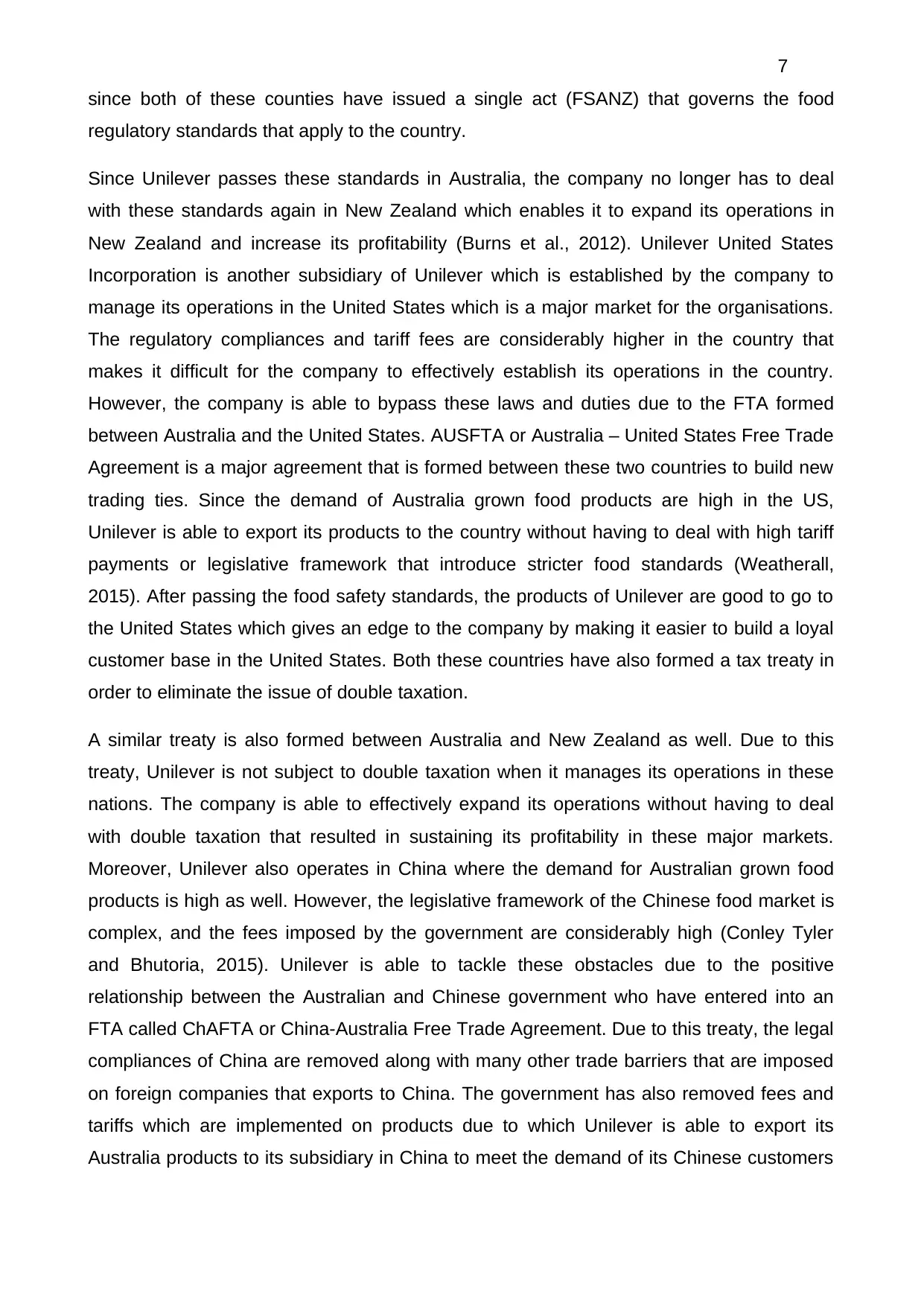
7
since both of these counties have issued a single act (FSANZ) that governs the food
regulatory standards that apply to the country.
Since Unilever passes these standards in Australia, the company no longer has to deal
with these standards again in New Zealand which enables it to expand its operations in
New Zealand and increase its profitability (Burns et al., 2012). Unilever United States
Incorporation is another subsidiary of Unilever which is established by the company to
manage its operations in the United States which is a major market for the organisations.
The regulatory compliances and tariff fees are considerably higher in the country that
makes it difficult for the company to effectively establish its operations in the country.
However, the company is able to bypass these laws and duties due to the FTA formed
between Australia and the United States. AUSFTA or Australia – United States Free Trade
Agreement is a major agreement that is formed between these two countries to build new
trading ties. Since the demand of Australia grown food products are high in the US,
Unilever is able to export its products to the country without having to deal with high tariff
payments or legislative framework that introduce stricter food standards (Weatherall,
2015). After passing the food safety standards, the products of Unilever are good to go to
the United States which gives an edge to the company by making it easier to build a loyal
customer base in the United States. Both these countries have also formed a tax treaty in
order to eliminate the issue of double taxation.
A similar treaty is also formed between Australia and New Zealand as well. Due to this
treaty, Unilever is not subject to double taxation when it manages its operations in these
nations. The company is able to effectively expand its operations without having to deal
with double taxation that resulted in sustaining its profitability in these major markets.
Moreover, Unilever also operates in China where the demand for Australian grown food
products is high as well. However, the legislative framework of the Chinese food market is
complex, and the fees imposed by the government are considerably high (Conley Tyler
and Bhutoria, 2015). Unilever is able to tackle these obstacles due to the positive
relationship between the Australian and Chinese government who have entered into an
FTA called ChAFTA or China-Australia Free Trade Agreement. Due to this treaty, the legal
compliances of China are removed along with many other trade barriers that are imposed
on foreign companies that exports to China. The government has also removed fees and
tariffs which are implemented on products due to which Unilever is able to export its
Australia products to its subsidiary in China to meet the demand of its Chinese customers
since both of these counties have issued a single act (FSANZ) that governs the food
regulatory standards that apply to the country.
Since Unilever passes these standards in Australia, the company no longer has to deal
with these standards again in New Zealand which enables it to expand its operations in
New Zealand and increase its profitability (Burns et al., 2012). Unilever United States
Incorporation is another subsidiary of Unilever which is established by the company to
manage its operations in the United States which is a major market for the organisations.
The regulatory compliances and tariff fees are considerably higher in the country that
makes it difficult for the company to effectively establish its operations in the country.
However, the company is able to bypass these laws and duties due to the FTA formed
between Australia and the United States. AUSFTA or Australia – United States Free Trade
Agreement is a major agreement that is formed between these two countries to build new
trading ties. Since the demand of Australia grown food products are high in the US,
Unilever is able to export its products to the country without having to deal with high tariff
payments or legislative framework that introduce stricter food standards (Weatherall,
2015). After passing the food safety standards, the products of Unilever are good to go to
the United States which gives an edge to the company by making it easier to build a loyal
customer base in the United States. Both these countries have also formed a tax treaty in
order to eliminate the issue of double taxation.
A similar treaty is also formed between Australia and New Zealand as well. Due to this
treaty, Unilever is not subject to double taxation when it manages its operations in these
nations. The company is able to effectively expand its operations without having to deal
with double taxation that resulted in sustaining its profitability in these major markets.
Moreover, Unilever also operates in China where the demand for Australian grown food
products is high as well. However, the legislative framework of the Chinese food market is
complex, and the fees imposed by the government are considerably high (Conley Tyler
and Bhutoria, 2015). Unilever is able to tackle these obstacles due to the positive
relationship between the Australian and Chinese government who have entered into an
FTA called ChAFTA or China-Australia Free Trade Agreement. Due to this treaty, the legal
compliances of China are removed along with many other trade barriers that are imposed
on foreign companies that exports to China. The government has also removed fees and
tariffs which are implemented on products due to which Unilever is able to export its
Australia products to its subsidiary in China to meet the demand of its Chinese customers
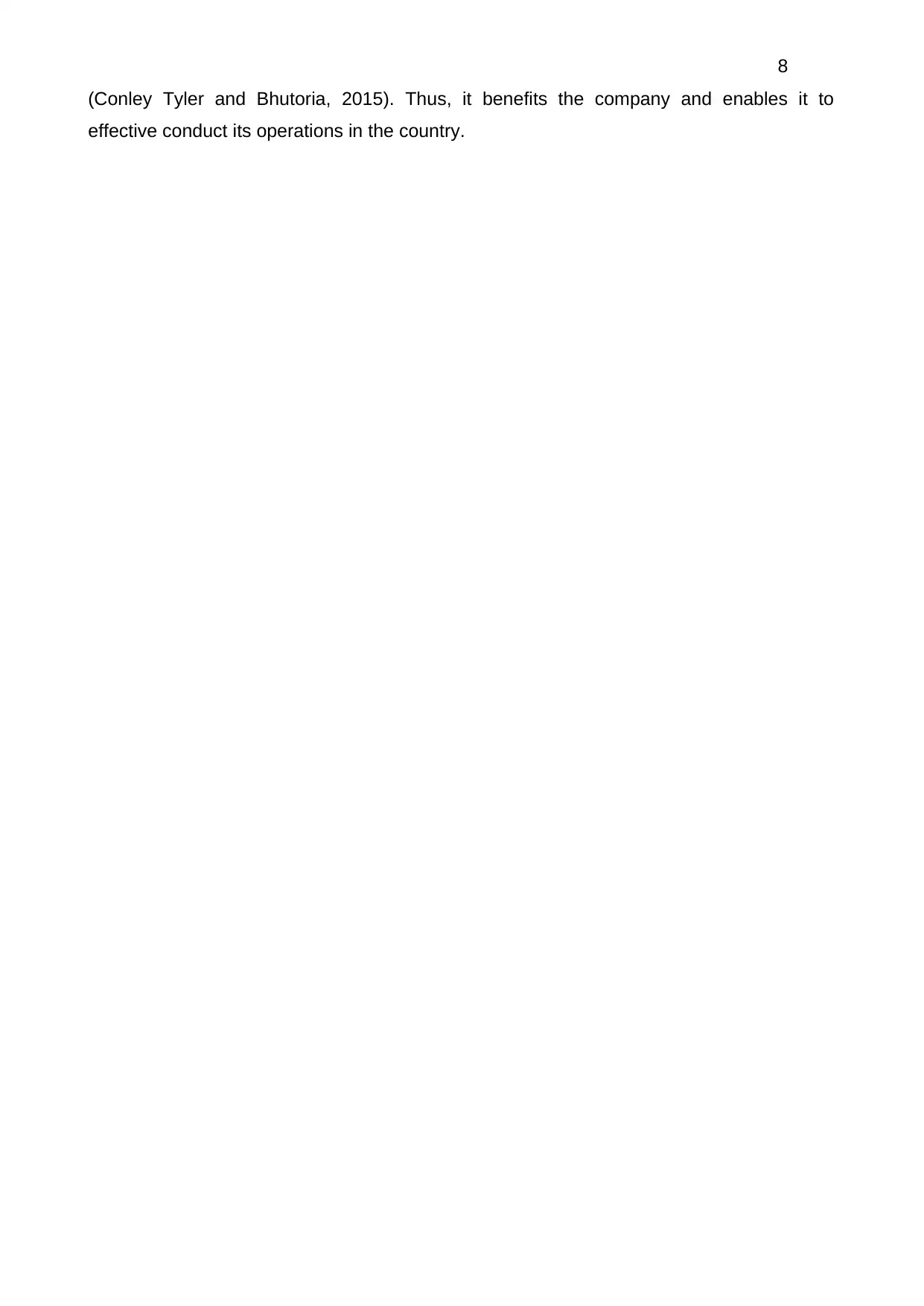
8
(Conley Tyler and Bhutoria, 2015). Thus, it benefits the company and enables it to
effective conduct its operations in the country.
(Conley Tyler and Bhutoria, 2015). Thus, it benefits the company and enables it to
effective conduct its operations in the country.
⊘ This is a preview!⊘
Do you want full access?
Subscribe today to unlock all pages.

Trusted by 1+ million students worldwide
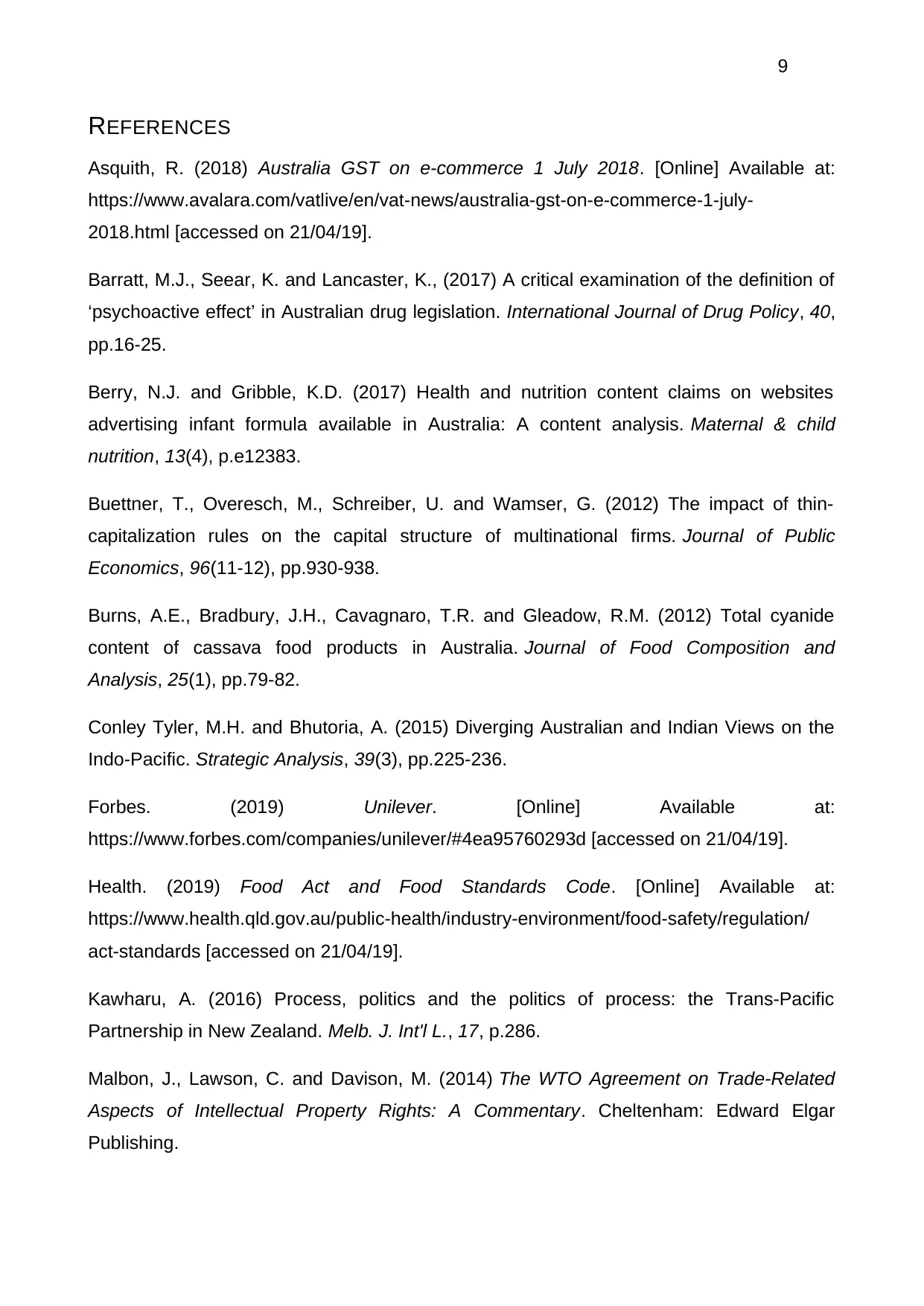
9
REFERENCES
Asquith, R. (2018) Australia GST on e-commerce 1 July 2018. [Online] Available at:
https://www.avalara.com/vatlive/en/vat-news/australia-gst-on-e-commerce-1-july-
2018.html [accessed on 21/04/19].
Barratt, M.J., Seear, K. and Lancaster, K., (2017) A critical examination of the definition of
‘psychoactive effect’ in Australian drug legislation. International Journal of Drug Policy, 40,
pp.16-25.
Berry, N.J. and Gribble, K.D. (2017) Health and nutrition content claims on websites
advertising infant formula available in Australia: A content analysis. Maternal & child
nutrition, 13(4), p.e12383.
Buettner, T., Overesch, M., Schreiber, U. and Wamser, G. (2012) The impact of thin-
capitalization rules on the capital structure of multinational firms. Journal of Public
Economics, 96(11-12), pp.930-938.
Burns, A.E., Bradbury, J.H., Cavagnaro, T.R. and Gleadow, R.M. (2012) Total cyanide
content of cassava food products in Australia. Journal of Food Composition and
Analysis, 25(1), pp.79-82.
Conley Tyler, M.H. and Bhutoria, A. (2015) Diverging Australian and Indian Views on the
Indo-Pacific. Strategic Analysis, 39(3), pp.225-236.
Forbes. (2019) Unilever. [Online] Available at:
https://www.forbes.com/companies/unilever/#4ea95760293d [accessed on 21/04/19].
Health. (2019) Food Act and Food Standards Code. [Online] Available at:
https://www.health.qld.gov.au/public-health/industry-environment/food-safety/regulation/
act-standards [accessed on 21/04/19].
Kawharu, A. (2016) Process, politics and the politics of process: the Trans-Pacific
Partnership in New Zealand. Melb. J. Int'l L., 17, p.286.
Malbon, J., Lawson, C. and Davison, M. (2014) The WTO Agreement on Trade-Related
Aspects of Intellectual Property Rights: A Commentary. Cheltenham: Edward Elgar
Publishing.
REFERENCES
Asquith, R. (2018) Australia GST on e-commerce 1 July 2018. [Online] Available at:
https://www.avalara.com/vatlive/en/vat-news/australia-gst-on-e-commerce-1-july-
2018.html [accessed on 21/04/19].
Barratt, M.J., Seear, K. and Lancaster, K., (2017) A critical examination of the definition of
‘psychoactive effect’ in Australian drug legislation. International Journal of Drug Policy, 40,
pp.16-25.
Berry, N.J. and Gribble, K.D. (2017) Health and nutrition content claims on websites
advertising infant formula available in Australia: A content analysis. Maternal & child
nutrition, 13(4), p.e12383.
Buettner, T., Overesch, M., Schreiber, U. and Wamser, G. (2012) The impact of thin-
capitalization rules on the capital structure of multinational firms. Journal of Public
Economics, 96(11-12), pp.930-938.
Burns, A.E., Bradbury, J.H., Cavagnaro, T.R. and Gleadow, R.M. (2012) Total cyanide
content of cassava food products in Australia. Journal of Food Composition and
Analysis, 25(1), pp.79-82.
Conley Tyler, M.H. and Bhutoria, A. (2015) Diverging Australian and Indian Views on the
Indo-Pacific. Strategic Analysis, 39(3), pp.225-236.
Forbes. (2019) Unilever. [Online] Available at:
https://www.forbes.com/companies/unilever/#4ea95760293d [accessed on 21/04/19].
Health. (2019) Food Act and Food Standards Code. [Online] Available at:
https://www.health.qld.gov.au/public-health/industry-environment/food-safety/regulation/
act-standards [accessed on 21/04/19].
Kawharu, A. (2016) Process, politics and the politics of process: the Trans-Pacific
Partnership in New Zealand. Melb. J. Int'l L., 17, p.286.
Malbon, J., Lawson, C. and Davison, M. (2014) The WTO Agreement on Trade-Related
Aspects of Intellectual Property Rights: A Commentary. Cheltenham: Edward Elgar
Publishing.
Paraphrase This Document
Need a fresh take? Get an instant paraphrase of this document with our AI Paraphraser
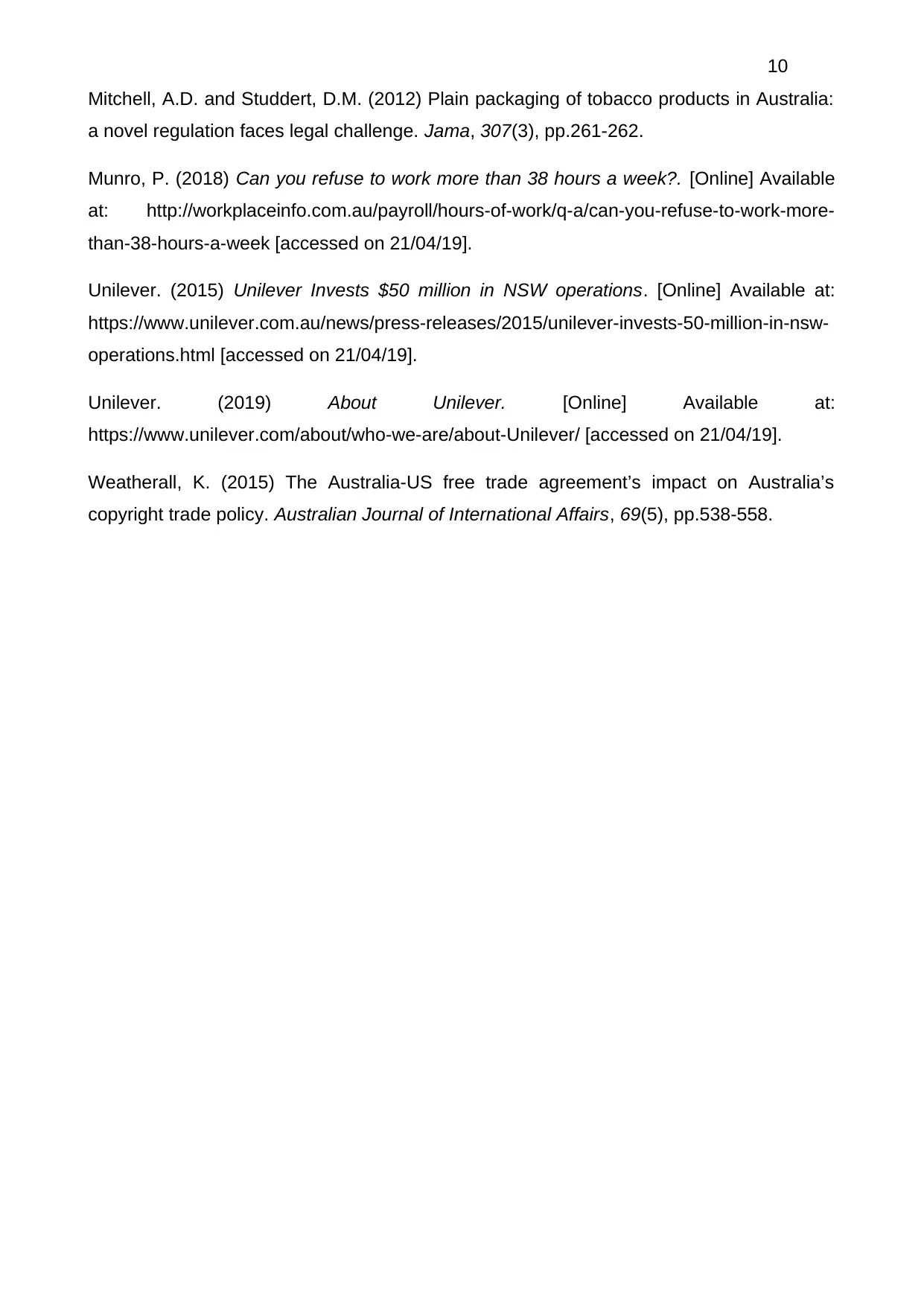
10
Mitchell, A.D. and Studdert, D.M. (2012) Plain packaging of tobacco products in Australia:
a novel regulation faces legal challenge. Jama, 307(3), pp.261-262.
Munro, P. (2018) Can you refuse to work more than 38 hours a week?. [Online] Available
at: http://workplaceinfo.com.au/payroll/hours-of-work/q-a/can-you-refuse-to-work-more-
than-38-hours-a-week [accessed on 21/04/19].
Unilever. (2015) Unilever Invests $50 million in NSW operations. [Online] Available at:
https://www.unilever.com.au/news/press-releases/2015/unilever-invests-50-million-in-nsw-
operations.html [accessed on 21/04/19].
Unilever. (2019) About Unilever. [Online] Available at:
https://www.unilever.com/about/who-we-are/about-Unilever/ [accessed on 21/04/19].
Weatherall, K. (2015) The Australia-US free trade agreement’s impact on Australia’s
copyright trade policy. Australian Journal of International Affairs, 69(5), pp.538-558.
Mitchell, A.D. and Studdert, D.M. (2012) Plain packaging of tobacco products in Australia:
a novel regulation faces legal challenge. Jama, 307(3), pp.261-262.
Munro, P. (2018) Can you refuse to work more than 38 hours a week?. [Online] Available
at: http://workplaceinfo.com.au/payroll/hours-of-work/q-a/can-you-refuse-to-work-more-
than-38-hours-a-week [accessed on 21/04/19].
Unilever. (2015) Unilever Invests $50 million in NSW operations. [Online] Available at:
https://www.unilever.com.au/news/press-releases/2015/unilever-invests-50-million-in-nsw-
operations.html [accessed on 21/04/19].
Unilever. (2019) About Unilever. [Online] Available at:
https://www.unilever.com/about/who-we-are/about-Unilever/ [accessed on 21/04/19].
Weatherall, K. (2015) The Australia-US free trade agreement’s impact on Australia’s
copyright trade policy. Australian Journal of International Affairs, 69(5), pp.538-558.
1 out of 11
Related Documents
Your All-in-One AI-Powered Toolkit for Academic Success.
+13062052269
info@desklib.com
Available 24*7 on WhatsApp / Email
![[object Object]](/_next/static/media/star-bottom.7253800d.svg)
Unlock your academic potential
Copyright © 2020–2026 A2Z Services. All Rights Reserved. Developed and managed by ZUCOL.





